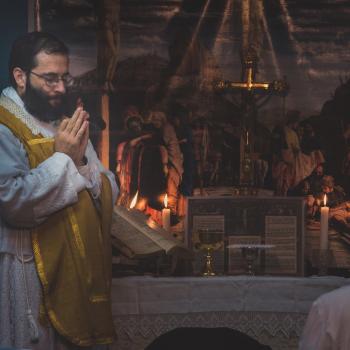
This week, news came out of Seattle of Robert Fuller who died via assisted suicide. Two reports about how his parish dealt with it also emerged. I will quote both reports. His story raises questions about how we as a Church should help people intent on assisted suicide or euthanasia. After the news stories, I will explain Church teaching.
Robert Fuller’s Story
At first, the report from AP via the Detroit News seems pretty normal now this is legal.
The day he picked to die, Robert Fuller had the party of a lifetime. […]
With an elaborately carved walking stick, he shuffled around to greet dozens of well-wishers and friends from across the decades, fellow church parishioners and social-work volunteers. The crowd spilled into a sunny courtyard on a beautiful spring day.
A gospel choir sang. A violinist and soprano performed “Ave Maria.” A Seattle poet recited an original piece imagining Fuller as a tree, with birds perched on his thoughts.
And when the time came, “Uncle Bob” banged his walking stick on the ceiling to command attention.
“I’ll be leaving you in a little over an hour,” he announced.
A sob burst. Fuller turned his head sympathetically toward its source.
“I’m so ready to go,” he said. “I’m tired.”
Later that afternoon, Fuller plunged two syringes filled with a light brown liquid — a fatal drug combination mixed with Kahlua, his favorite alcohol — into a feeding tube in his abdomen. He was one of about 1,200 people who have used Washington’s Death with Dignity Act to end their lives in the decade since it became law.
Fuller’s Relationship with the Church
The same report had a summary of Mr. Fuller’s life including advocacy promoting assisted suicide as a member of the Hemlock SOciety. Then it gets to his relationship with the Church relying on the testimony of the parish choir director.
Fuller began returning more often to the Catholic church he had long attended. His spiritual views were hardly orthodox – he considered himself a shaman, and described his impending death as a state of “perpetual meditation” – but Seattle’s St. Therese Parish was known for accommodating a range of beliefs. Fuller was beloved there, and he craved the community. He had sung in the gospel choir and read scriptures from the lectern during services, sometimes delivering insightful or funny remarks off the cuff, said Kent Stevenson, the choir’s director.
Stevenson credited the “tenacity and clarity” of Fuller’s choice.
“It was hard to even cry because he was so forthcoming and so sober about it,” Stevenson said. “He was just so outrageously unique and such a character, this was completely in keeping with who Bob was.”
The Roman Catholic Church opposes aid-in-dying laws, citing the sanctity of life. But Fuller’s decision was widely known and accepted among the parishioners. At the service where he received his last communion on May 5, the Rev. Quentin Dupont brought over a group of white-clad children who were receiving their first communion. [The story included a photo of this blessing but I don’t have the money to pay AP for the image.]
They raised their arms and blessed him.
Archbishops Correct the Story
Seattle’s archbishop and coadjutor posted a statement after this story. They indicate something different was happening in the image of the priest and first communicants blessing Fuller.
At the time of this photo, parish leadership was not aware of Mr. Fuller’s intentions. That morning, the priest in the photograph was told Mr. Fuller was dying and wanted the blessing of the faith community. It wasn’t until later that parish leaders learned of his plans. When these plans were made known, the pastor met with Mr. Fuller to discuss the sacred gift of human life and how we are called to respect and revere that gift as disciples of Jesus. […]
The Archbishops are reviewing the events reported in this story, even though they took place several months ago. They will work to clarify any confusion or misunderstanding, which this article may have generated.
The statement reaffirms Church teaching between those two paragraphs.
Catholics believe that all life is a gift from God. Every person has inherent and inalienable dignity because we are made in God’s image and likeness. This is why we protect and promote the sanctity of life in all of its stages. Based on this teaching and concern for human life and the common good, the Catholic Church does not support suicide in any form, including medically assisted suicide.
The two Archbishops promised an investigation into the event.
Analysis
Alberta & NWT Bishops
When laws allowing the practice of euthanasia and assisted suicide in Canada were passed, the bishops of my home province offered some clear guidelines. The guidelines are long so I’m just grabbing highlights.
[reagrding the sacreament of penance:] If the penitent, having been made aware of the gravity of the situation, is open to learning the Church’s teaching on this issue, and open to reconsidering the decision, the priest can absolve. There is at least the beginning of contrition, a willingness to reconsider and thus possibly rectify their situation. If they are not open at least to prayerfully considering the rescinding of their request – now that they know it is a grave sin – they would be choosing to do something gravely wrong, that is to say, deciding to remain in a situation of sin rather than seek to amend their life. In this case, the minister would need to delay absolution to a later time when the person may be properly disposed. [Anointing is similar:] If the person… remains obstinate, the Anointing cannot be celebrated. [Christians funerals for those who died by suicide can be celebrated if their disposition is unknown as we don’t judge culpability. However, when assisted suicide is clearly sought out and declared with a clear mind, a funeral must be withheld.] There may also be the case, however, of a family or friends that wish the funeral rites to be an occasion to celebrate the decision of their loved one to die by assisted suicide or euthanasia and thus to promote these practices as acceptable. This would be truly scandalous, as it would be an encouragement to others to engage in the evil that is euthanasia and assisted suicide. Such a request for funeral rites must be gently but firmly denied.
If you are interested, I definitely encourage you to read the 30-page document. It is eminently pastoral although I grabbed the firmer sections for clarity here.
Denying sacraments or a funeral is not to punish these people. Without contrition (see below), these two sacraments simply cannot happen. Christian funerals are for when there is plausible hope for heaven. If someone dies denying their faith knowingly and willingly, that makes hope for heaven rather implausible. As well, in both cases, there is a serious issue of scandal in the Church seeming to allow immoral acts if the assisted suicide or euthanasia is public.
Moral Analysis
I offer two quick points of moral analysis. First, The need to desire not to sin for a valid sacrament of confession. Second, that assisted suicide is grave matter and thus mortal sin if known and willed.
Contrition
Trent defines Contrition as absolutely necessary for confession. The ecumenical council of Florence listed three key acts of the penitent in Confession: contrition, confession of sins, and satisfaction. Trent took up the same three acts but added, “These acts are by divine institution required by the penitent for the integrity of the sacrament and for the full and complete forgiveness of sins.” Furthermore, Trent said, “Contrition holds first place among the acts of the penitent mentioned above.” Then, it explains that contrition “consists in the sorrow of the soul and the detestation of sin committed, together with the resolve not to sin any more.”
The importance of contrition also applies for the anointing of the sick as that sacrament can forgive sin and Trent states, “This disposition of contrition was necessary at all times for the forgiveness of sins.”
Assisted Suicide is Grave Matter
The Catechism does not use the phrase “assisted suicide.” However, teaching on assisted suicide is very clear reading numbers on euthanasia and suicide.
2277 Whatever its motives and means, direct euthanasia consists in putting an end to the lives of handicapped, sick, or dying persons. It is morally unacceptable.
2281 Suicide contradicts the natural inclination of the human being to preserve and perpetuate his life. It is gravely contrary to the just love of self. It likewise offends love of neighbor because it unjustly breaks the ties of solidarity with family, nation, and other human societies to which we continue to have obligations. Suicide is contrary to love for the living God.
2282 …Grave psychological disturbances, anguish, or grave fear of hardship, suffering, or torture can diminish the responsibility of the one committing suicide.
I think these make it very clear it is grave matter.
Conclusion
We must fight laws that legalize the murder of the sick and disabled through assisted suicide and euthanasia. When such laws get passed, we need to be careful in pastoral practice regarding those planning these methods of ending their life. We cannot offer sacraments before death if someone is not contrite regarding this act, and if they clearly did it willingly, a funeral may even need to be withheld. This is not to punish the person. Sacraments attempted in such a circumstance would not happen but just be a show. Also, funerals or offering the sacraments can’t cause scandal among the faithful.
Note: If you want to see more like this, I rely on donations to continue writing. Please sponsor me on Patreon.
UPDATE:
Catholic News Agency managed to go through Fuller’s social media and made some interesting discoveries.
In a March 16 Facebook post, Fuller claimed that he had completed the legal steps required to receive a prescription of life-ending drugs, and that he had the approval of a priest to end his own life.
“I have absolutely no reservations about what I am doing,” he wrote. “And my pastor/sponsor has given me his blessings. And he’s a Jesuit!!!” […]
Other posts on Fuller’s Facebook page recount that he met with parish staff as he planned the final days of his life, including a party held in the hours before his suicide on May 10, and his own funeral.
On May 4, Fuller posted details of his upcoming funeral, which he had arranged to be held in the parish on May 17. […]
On March 3, Fuller posted that he had arranged for one of the musicians at the parish to perform during his end of life “party” to mark his suicide. Three weeks later, he posted that a parish choir would perform as well.
“Today I asked our choir director if he and other musicians and singers can come perform during the first 1 1/2 hours and he emphatically replied YES. OF COURSE!” wrote Fuller on March 24.
UPDATE #2:
The Archdiocese issued a second statement.
The priest was a visiting priest who happened to be at St. Therese that particular Sunday when the pastor was celebrating Mass at his second parish. The blessing was done after Mass by the priest whose interest was to bring comfort to someone he learned was dying. The priest was not aware of any news photographer, although he was aware people were taking pictures.
While it is clear that some of Mr. Fuller’s friends at the parish knew of his intentions, the pastor at St. Therese initially did not. Mr. Fuller eventually approached the pastor to ask to plan his own funeral. The pastor discussed the gift of life and tried to convince him to change his mind. He made it clear that neither he nor the parish could support his plan to take his own life. Once it was clear that Mr. Fuller was not going to change his mind, the pastor reached out to his leadership to discuss the situation.
Archbishop Sartain agreed that it is the church’s responsibility to pastorally care for those who mourn. With this in mind, he gave permission for the funeral with certain conditions to ensure there was no endorsement or other perceived support for the way in which Mr. Fuller ended his life. The purpose of the funeral was to pray for his soul and bring comfort and consolation to those who mourned.












